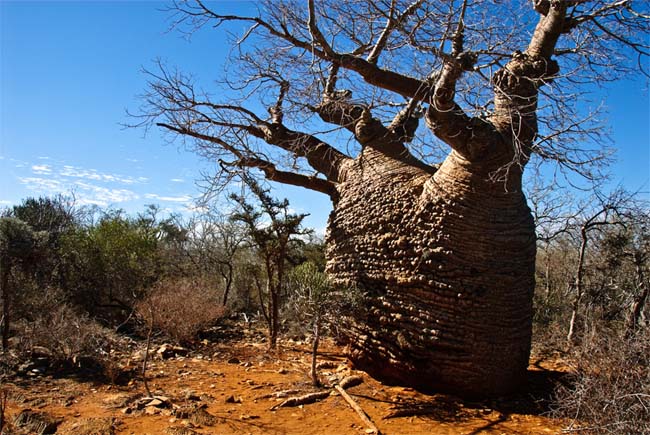
One morning, after reaching the baobab trees at a steady jog, I spied several large, crimson and purple cactus fruits ("raketa" in Antandroy). After mentioning I hadn't yet tried the fruit, Resaka started to maneuver his fingers through the labyrinth of thorns to snag a handful. He carefully rubbed the short, hair-like thorns away on a mat of moss and then showed me how to pull the peel back with my teeth. My stress lifted as I laughed with my new friend eating the cherry-flavored treat, and watching the peach-pink sunrise burn into a cloudless hot day. I ran home feeling as lucky and free as a bird that Resaka had failed to hit.
Peace Corps Volunteer Malagasy Musings writes: The Town with No Room
The Town with No Room
Impressions in the South of Madagascar
21.01.2008 sunny 36 °C
Caption: the mother baobab by gr0uch0 Flickr Creative Commons Attribution-Noncommercial-No Derivative Works 2.0 Generic
Sometimes Tsihombe lives up to its name. Meaning "no room", Tsihombe can often feel very claustrophobic, like a small sphere inhabited by too many big personalities. When the heat of the afternoon settles in the sticky sweat of your clothes or slows your walk to and from the market to a dull plod, you feel like running wild and naked to the closest water source, the Manombovo River where you have to dig a hole to find water. Or when teaching English to Second students (the equivalent of sophomores in high school), whose behavior often bespeaks of their rebellious teenage years. I feel like gliding from the higher elevation of the lycee and into the spiny forest that begins at the outskirts of the town and stretches out into the horizon, the low level of thorny trees and cactus only interrupted by the protrusion of a Buddha-bellied baobab tree.
My small one room concrete house is located in the same compound as a large Antandroy family (Antandroy being an ethnic group and tribe with more African than Asian roots in the southernmost region of Madagascar). The width of a standard swimming pool is the short distance between our houses, a distance that proves useless in maintaining our American love of privacy. Sitting alone to read a book or to daydream is unheard of here, and I often entertain my new sisters of students in my home at times when I would rather collect my thoughts and reflect on the day.
One "fomba", or tradition, I still struggle with is the sharing of food. Often, Antandroy families eat from the same dishes, everyone taking their share by the spoonful. Some deep seated American feeling of entitlement and ownership bubbles up in me when one of the many children in the yard or one of my sisters and I are hovering over the same plate. Especially when a spoon dives into my side of the dish and steals away with a piece of meat I'd been eying.
Perhaps it's not the custom of every Antandroy family, but when returning from the market, I am questioned by my sisters and my mama as to the contents of my basket and am expected to hand over a share of my sweet potatoes or mangoes. At first, I balked at these demands for my food, leading me to hide my grilled sweet potatoes, a favorite snack, in my school bag and to eat them rapaciously in what brief privacy I had in my house before my gluttonous rampage could be discovered and my begedas ( sweet potatoes) taken from me. Fortunately, I have learned to adapt to the passing of food from hand to hand, a poetic lesson in sharing. When fresh fish travels 18 miles from the sea and arrives in the market, my family ensures I have my share, head and all (the brain and jaw muscles considered the most delicious part). I in turn buy a little extra of each item in the market in case my daily basket inspection is of particular interest to my family.
But Tsihombe is not always oppressively hot, not always a town with "no room". There are days when the wind cools the sweat on your brow or the clouds purge themselves of violent bouts of rain and leave the children pointing at the heavy colored brush strokes in a fresh rainbow, their bicycle tire jump ropes left slack in the sand.
There are days when I don't feel like I have to run a cultural gauntlet, when the Antandroy people and myself are just people; people taking pleasure in little things, forgetting for brief moments that we are living in an impoverished country and perhaps even disregarding that I am pale and a foreigner among them.
Nearly every morning I go running down a road that cuts through the Spiny Forest. Never alone, I am accompanied by my friend and student, Resaka. Together we go as far as a pair of baobab trees before returning home, and sometimes, as I am cumbersomely trying to mount a hill and staring at my feet, Resaka scoops up a rock in a flash and hurls it at a forest bird. So far he's missed, and I often tease him, saying, "Where's the bird? I'm hungry".
It's the days of unexpected, random pleasures that make you feel like the world has just breathed deeply with a sigh of relief. My life fenced in by classes, conversation groups, the heat, and people's demands for more conversation groups, food, or money, suddenly expands and finds the space it had so long craved.
One morning, after reaching the baobab trees at a steady jog, I spied several large, crimson and purple cactus fruits ("raketa" in Antandroy). After mentioning I hadn't yet tried the fruit, Resaka started to maneuver his fingers through the labyrinth of thorns to snag a handful. He carefully rubbed the short, hair-like thorns away on a mat of moss and then showed me how to pull the peel back with my teeth. My stress lifted as I laughed with my new friend eating the cherry-flavored treat, and watching the peach-pink sunrise burn into a cloudless hot day. I ran home feeling as lucky and free as a bird that Resaka had failed to hit.
I cannot document all the moments in which my decision to join the Peace Corps has been affirmed in a most enlightening way--they are many, and you would need to be in the midst of the food, the landscape, and the people--the beautiful, proud, and unique Antandroy people to understand this new life. The smells of the spiny forest, especially after a rain; the look of galloping joy in the eyes of my students when they understand and relish a lesson; being brought stomach settling grilled fish by my family when my trips to the kabone (or sheltered hole in the ground) are much too frequent; being given free coffee by my favorite grilled sweet potato vendor and sharing the events of the day with her as I swill the drink down to the sugar settled at the bottom of the cup.
I am given so much here. I only hope I can begin to inspire the same wonder of the wide world that this little town with no room has inspired in me.












